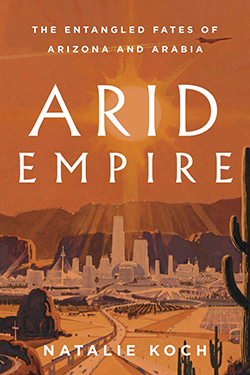
In her recently published book, “Arid Empire: The Entangled Fates of Arizona and Arabia” (Verso, 2023), Maxwell School faculty member Natalie Koch explores the exchange of colonial technologies between the Arabian Peninsula and the United States over the last two centuries.
In her narrative history, Koch asserts that the iconic deserts of the American southwest could not have been colonized and settled without the help of desert experts from the Middle East. She shares how, for instance, a caravan of 33 camels, led by a Syrian cameleer the Americans called "Hi Jolly,” arrived in Indianola, Texas, in 1856. The U.S. government hoped that this would be the start of a "camel corps" to help the miliary secure the new southwest swath of the country just wrested from Mexico. Though the corps didn’t continue, the idea of drawing on expertise, knowledge and practices from the desert countries of the Middle East has persisted for the past 150 years.
Koch maintains that the exchange of colonial technologies—from date palm farming and desert agriculture to the utopian science fiction dreams of the Arizona science research facility Biosphere 2 and Frank Herbert’s science fiction series “Dune”—have bound the two regions together, solidifying the colonization of the American west and the reach of American power into the Middle East.
Koch is professor of geography and the environment as well as director of the Central Asia and the Caucasus Research Group, and a senior research associate in the Middle Eastern Studies Program. Her research interests include political geography, nationalism, energy and the environment, and Gulf and Arabian Peninsula area studies. She received a Ph.D. from the University of Colorado, Boulder in 2012.
From the publisher:
The iconic deserts of the American southwest could not have been colonized and settled without the help of desert experts from the Middle East. For example: In 1856, a caravan of thirty-three camels arrived in Indianola, Texas, led by a Syrian cameleer the Americans called "Hi Jolly." This "camel corps," the US government hoped, could help the army secure the new southwest swath of the country just wrested from Mexico. Though the dream of the camel corps—and sadly, the camels—died, the idea of drawing on expertise, knowledge, and practices from the desert countries of the Middle East did not.
As Natalie Koch demonstrates in this evocative, narrative history, the exchange of colonial technologies between the Arabian Peninsula and United States over the past two centuries—from date palm farming and desert agriculture to the utopian sci-fi dreams of Biosphere 2 and Frank Herbert’s Dune—bound the two regions together, solidifying the colonization of the US West and, eventually, the reach of American power into the Middle East. Koch teaches us to see deserts anew, not as mythic sites of romance or empty wastelands but as an "arid empire," a crucial political space where imperial dreams coalesce.
Published in the Spring 2023 issue of the Maxwell Perspective
Related News
Commentary

Dec 3, 2025
Commentary

Dec 2, 2025

